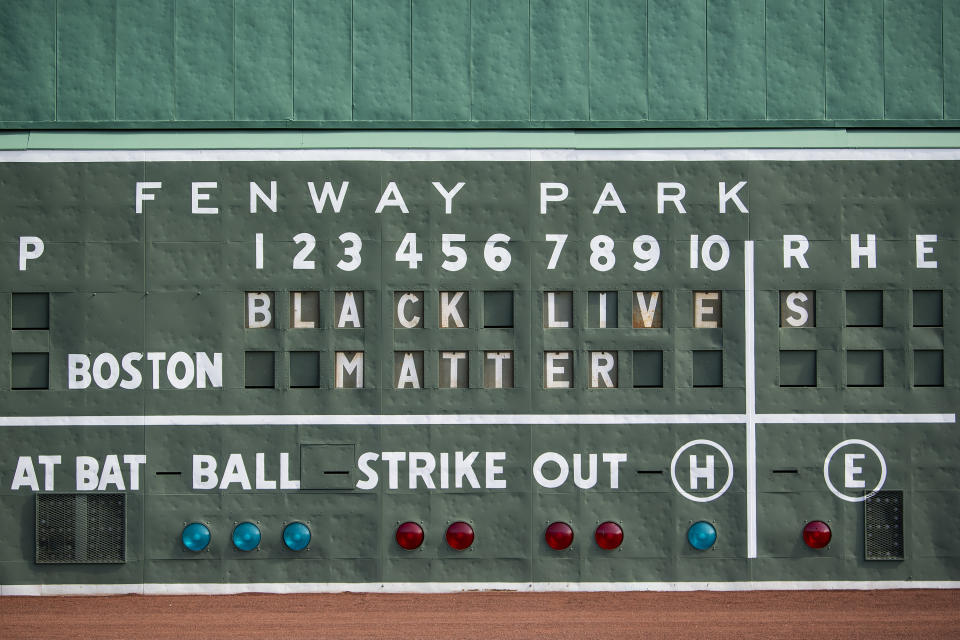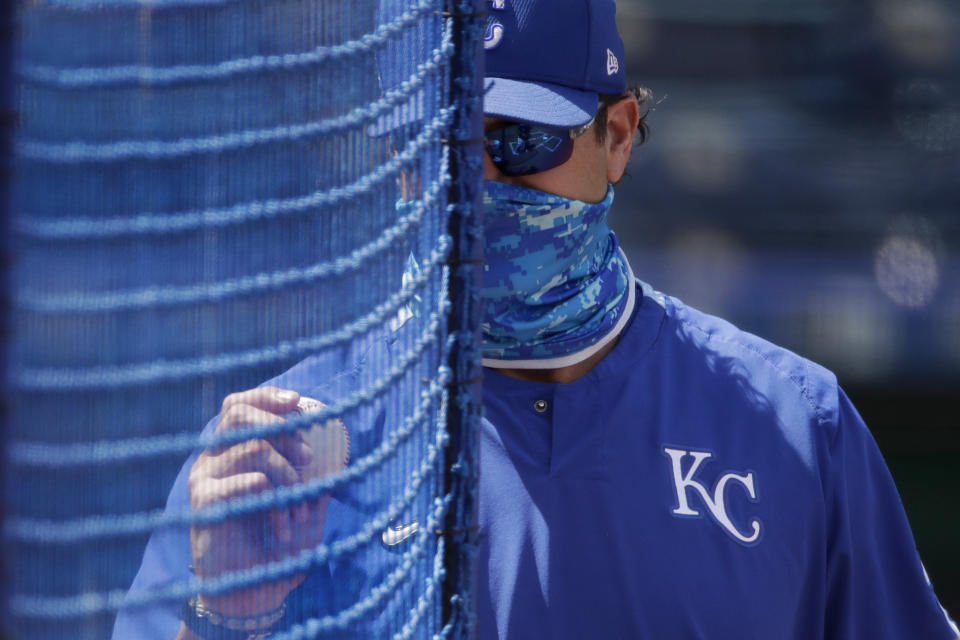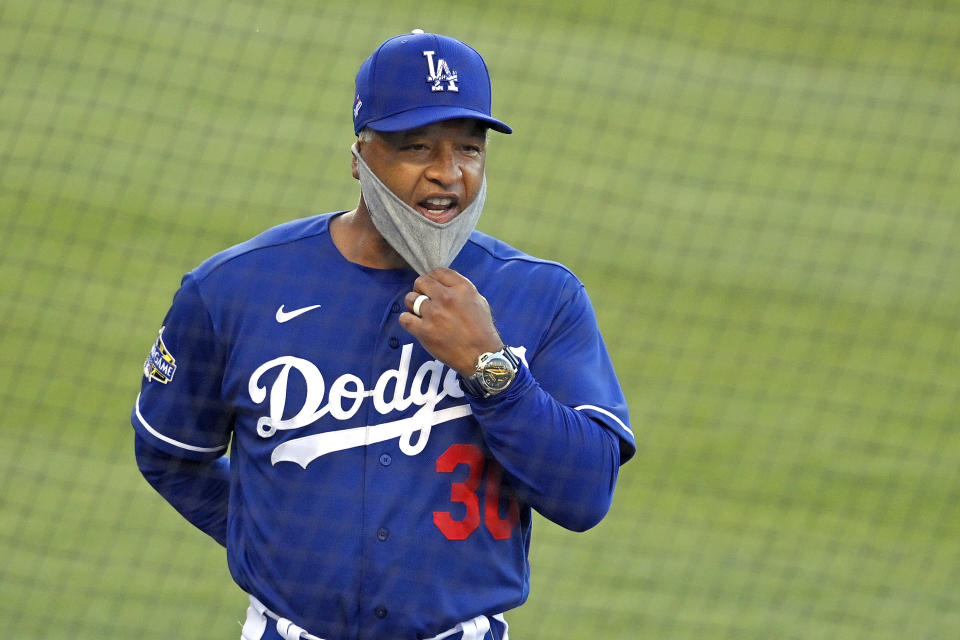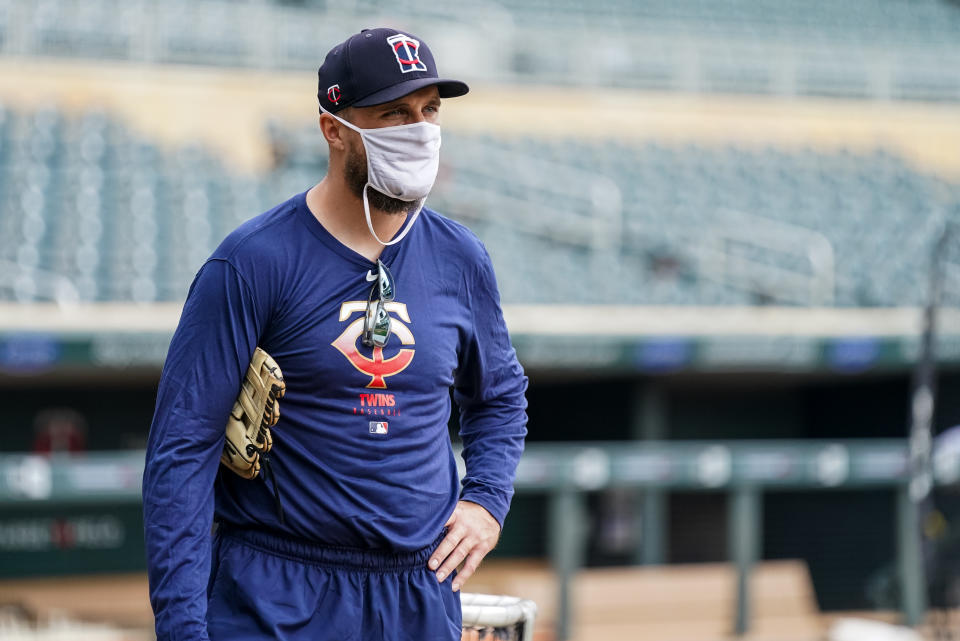A changed world: MLB managers explain how they are leading clubhouses after George Floyd, coronavirus
Out into the world and into baseball clubhouses they come, grown and sturdy men who five months ago imagined the summer would be no different than any of their summers.
If nothing else, and more than a few had been raised on little else, there’d be baseball.
For many, the game was their first crush before it was their steady, their first hustle before it was their career, their first blush of faith before it was their soul. You come to rely on a presence like that, a routine that hardly requires steering anymore, just the tap-tap-tap to keep it centered.
To some of them, then, a worthy leader was the coach who put them in the lineup, preferably in the middle of it, and told them they could do this. The rest was their own sweat, their own resolve, their own gift, and then a lifetime of running fastballs and bat barrels.
Summer is three weeks gone, though. What’s passing for baseball is a brooding ballpark and a clubby in right field. The world they stepped out of for this one, for the first time maybe ever, looks and feels pretty similar. People are sick. People are angry. People are afraid. People are unsure. Just really unsure.
On March 12, as the coronavirus pandemic came into view, Major League Baseball suspended spring training, in effect delaying its opening day. Thirteen days later, a Black man named George Floyd was killed by a police officer outside a convenience store in Minneapolis. Three fellow officers watched.
The virus spread, filling hospital beds, forcing mass quarantines, killing tens of thousands and pitting science against politics and an overmatched White House. Protest marches against centuries-long and systematic racial injustices — a full-throated resolve for Black Lives Matter and a reinvigorated civil rights movement — packed the streets and consciences of many cities.

America, society, towns, neighborhoods, the people in them, had arrived at a reckoning. Another one. Forced into their homes by a pandemic, they’d been drawn out by an awakening that asked the questions, Who am I?, What do I believe in? and What the hell am I going to do about it?
In that climate, and after a labor slap fight, baseball brought them all back. The virus is more — not less — rooted than it was on March 12. Players opted out. More will. Others were found to be infected. The safety protocols are stifling, making life around the games uncomfortable at best. The testing that was to be comprehensive enough to allay fears had holes. The season is so short as to be nearly inconsequential and, besides, teeters on the whims of a ravenous virus.
The marches persist. The road seems long. The injustices persist. A divided nation means a divided clubhouse. Voices of the oppressed, of the sick and tired, of the courageous, are carrying. Baseball’s leaders, from the front office to the top step, are overwhelmingly white. The game can be deaf, or act as such.
The grown and sturdy men dropped their bags and peeked in.
Maybe they’d gotten married or had a child. They might’ve healed from an injury. They’d celebrated the prior summer or wondered what had gone wrong and then went about mending that. Some were rewarded with massive contracts, the sort of tiny miracle that alters the lives of generations.
Maybe they’d marched and raised their fists and shouted the names and committed themselves to more. Black and white, maybe they’d resolved to learn more, to act more, to be more. To count for something.
Three-and-a-half months later, a different player walked into those clubhouses. They were met, probably, and with any luck, by a different leader, a manager who, by the way, lived those same three-and-a-half months.
We asked seven managers if they have reconsidered — or reprioritized — the fundamental values of their leadership doctrines. All of them agreed the job had changed — become bigger, or more challenging — because of the events of recent months.

Mike Matheny, Kansas City Royals
“I’d say the development of any leadership skills has been more listening and learning and trying to understand better. And to try and have some of these players who have been directly affected and have a strong stance and have had some history and have had a life that we say we can try to empathize with but truly can’t.
“So, help me understand better. Help me learn. Our guys have been great. You know I love to read. So they’ve forwarded a couple books (“Race Matters,” by Cornel West, for one), forwarded some ideas or podcasts and, ‘Here’s some things that are said really well to help you understand better.’ So that’s something we’ve tried to do as an entire staff, is pass along some things, some information.
“Let’s learn from this. I think that’s our responsibility as a nation, to learn and respond appropriately. Once again, proud of our guys being candid. It’s not easy having those conversations, let alone with somebody you might see as a coach or boss. One of the benefits of this time is to be able to jump into life together a little bit differently than what you would normally do when you’re just thinking baseball every day. These are some major issues and some things I believe have really opened all our eyes, with conversations that have just been priceless for me to understand our guys better.”
Dave Roberts, Los Angeles Dodgers
“I think it’s about listening. It’s an easy answer. It’s hard for people to execute it consistently. In light of what has happened in the last few months in our country, some people have been more impacted more directly than others. As far as for me as a manager, I really have to be sensitive to everyone, each individual’s thoughts, concerns and questions about all the different topics. We as an organization have discussed them all. I’ve got to continue to be open and listen.
“It’s a bigger job and a bigger responsibility. I look at it as a bigger opportunity. I’ve always believed that if you can get people more socially aware, more looking outward as opposed to looking inward, you’re going to be a better player as well. This is certainly an opportunity.”

Derek Shelton, Pittsburgh Pirates
“I think what makes an effective leader in any time is an ability to communicate. I think the best leaders listen probably more than they talk. We have to listen to our players. We have to give them the forum to voice their opinions. Then, continue to talk with them about it. I think that’s one thing I’m very proud of as we’ve gone through these challenging times the last few weeks is we’ve allowed our players to have a voice and they’ve voiced them and we’re listening to them and we’re continuing to educate and making sure that their thoughts are very purposeful. I’m very proud of our group, what they’ve stated, how they’ve stated it and the fact we have continued to give them the forum to do that. As a leader, it’s my responsibility to listen to our group. And to make sure their thoughts are something we get out there and we continue to make sure our support is there for them.
“It’s made me a better listener. It’s made me a better learner. Because there were some things that I probably wasn’t aware of. I think it’s important for my job as a leader of this team, it’s my job as a parent, to make sure that I continue to learn and educate myself so I can have educated conversations with our players and educated conversations with my children. I feel very fortunate with the group of guys we have here and the conversations we’ve had and the things they’ve taught me during this time.”
Rocco Baldelli, Minnesota Twins
“We’re always reconsidering, thinking about and bringing to the table to our players and to our organization the things that we think are most important. In any role, it’s hard to focus on everything. So you do have to prioritize the things that are most important to you, to bring to the men and women you work with.
“A lot of what we’ve all experienced recently in Minneapolis, throughout the country, it’s a very significant time. We’ve talked about things that I’ve never openly talked about in the game. And I know many people in our clubhouse have never openly talked about in the game. And I think it’s very welcome. It’s been a very empowering period of time for all of our people. To different extents, maybe, for each one of us. But I think we’ve probably learned different things about ourselves, especially over the last few weeks, that some of us that have been in the game for a very long time had never really touched on and never really felt to this point. So, yeah, I do think that anyone, regardless of what position you’re in, if you’re just a human being that believes in things, it’s all the same. But I think it is our job to consistently just be reevaluating what is most important and not be afraid to have conversations about things just because it’s uncomfortable. If it’s important, it’s important and should be talked about.

“Especially related to the George Floyd, uh, murder, essentially. Everything that’s come from that has affected our group a lot. We’ve come together as a group numerous times to discuss this. When I tell you that, that sort of thing I’ve never seen in baseball in the short 20 years that I’ve spent in the game, I’ve never experienced that before. When I tell you it’s empowering to be able to discuss things and talk about things and be vulnerable amongst your teammates and your fellow coaches and your staff members and to tell people how you really feel about things that are important to you, that is very, very empowering.
“And it feels late. But there is no better time than now to do it. I’m very proud of the way our guys have handled all of these discussions. I’m very proud of the way guys have stepped up and probably breathed in a way that they’ve never really felt before, where they’re able to say these things. I think it’s been a very welcome and beautiful thing that came from something so tragic.”
Don Mattingly, Miami Marlins
“It feels like from the time that we shut down spring training and went home, watching the news and everything that’s gone on, a little bit of a different world we’re in. I’d say a lot of positives in that, in the fact of communication. For me, leadership is about being yourself, being honest with guys, always preparing and getting better. I think the issues and different things that have come up really fit comfortably for me. My foundation has been a foundation that’s working within the inner city and to underserved kids and families, to bring equality to that. So I’m really comfortable in that area. So I think I want to be myself. You try to be the person that you are and make adjustments. Right? We’re asking everybody to make adjustments. I gotta make adjustments as a leader, as a person that’s leading this group. We gotta be a leader from our standpoint as a staff to encourage our guys.”
Gabe Kapler, San Francisco Giants
“I think this time period has made it a necessity that we reevaluate leadership. I can give you some personal examples. I’m generally pretty focused on baseball things once I walk into the stadium, and I have been for quite some time. I’m really driven and excited about digging into the baseball components. At the same time, I know there are things on people’s minds right now that are pretty unrelated to baseball. Those things are health and well-being, for sure. Those things are sometimes being fed up with racial injustice, systemic racism and in a lot of ways leadership in our country and in the world right now.
“So I have prioritized having those discussions and even said out loud, these things are more important than baseball right now. And I mean that. I would prefer to have a conversation with a player right now that has nothing to do with baseball and everything to do with what they’re experiencing during this time period, learning their perspectives and being part of shaping the way they think about the things that are happening in our world.
“It feels different. It feels different than it did four months ago. And it feels like the things that we need to be focused on are different as well.”
Joe Maddon, Los Angeles Angels
“I don’t think it changes how you do this. I think what you’re talking about, I think, is are you changing your beliefs? From the movement that has occurred socially, with the unrest, the Black Lives Matter movement, with the pandemic, having to deal with that, a labor strife with the union itself, playing baseball and then not playing baseball, then having to reignite the ignition and starting all over again. That causes you, there’s a potential shift in what we believe in internally, as a person, more than leadership style. I think.
“My style, I think, my method has always been to go right after, and I don’t want to stay attack, but confront the situation. And I’ve already had a good conversation with several, with a lot of the guys, via Zoom, on a variety of different topics. So we’re going to continue to do that. I think it’s important that, there’s a lot of people that, you know, you need to know, ‘What do I think?’ … It can be very illuminating for a lot of us, absolutely. But I don’t know that it changes a style as much as it changes what you think or believe. That’s what we’re being confronted with right now.”
More from Yahoo Sports:

